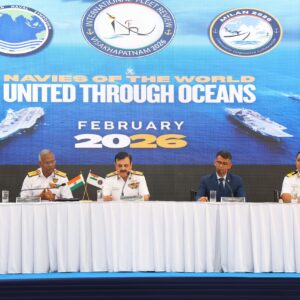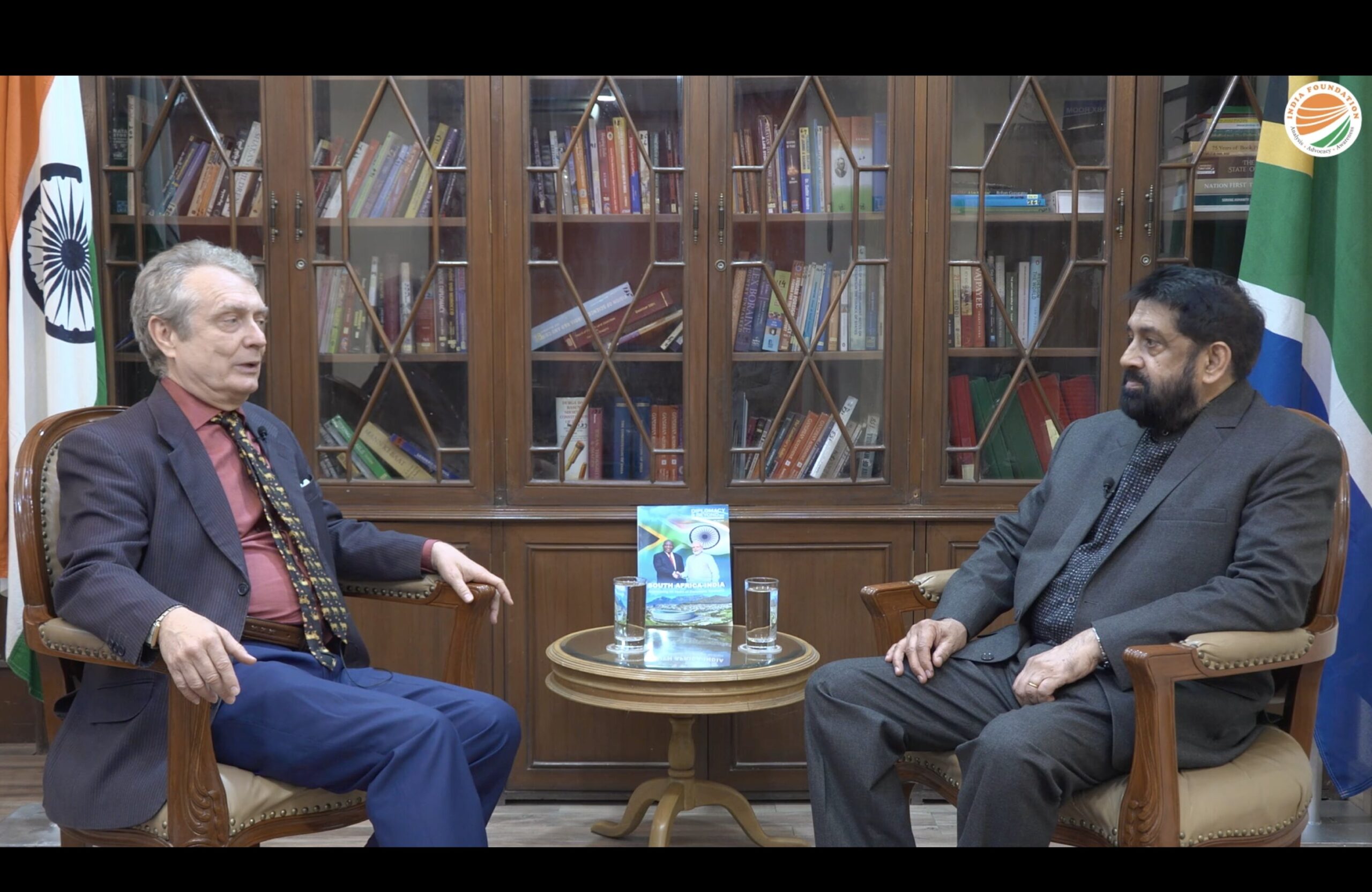India Foundation organized the 8th round of India Foundation-Fudan University Bilateral Conference on November 18, 2023 at the India Habitat Centre, New Delhi themed ‘India-China Bilateralism: Potential & Challenges’. A five-member delegation from Fudan University, Shanghai, China participated in the dialogue. The members of the delegation were: Prof. Zhang Jiadong, Director of Center for South Asia Studies, Fudan University; Prof. Liu Zongyi, Director, Institute for International Strategic and Security Studies; Prof. Tu Yichao, Associate Professor, Center for American Studies, Fudan University; Prof. Wei Zongyou, Professor, Center for American Studies, Fudan University and Prof. Xie Chao, Associate Professor at the Institute of International Studies, Fudan University.
Inaugural Session
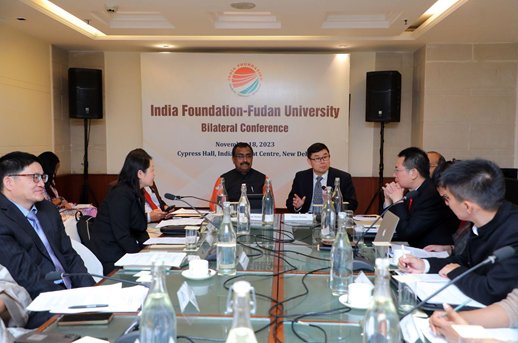
The Inaugural Session of India Foundation-Fudan University Bilateral Conference 2023 commenced with the Welcome Remarks by Capt Alok Bansal, Director, India Foundation where he welcomed the delegation from Fudan University to India.
In his Introductory Remarks, Prof. Zhang Jiadong, referred to the success of the previous Conferences which have been conducted since 2014 and have been a mark of mutual cooperation and persistence between the two organizations.
The Keynote Address was delivered by Dr Ram Madhav, President, India Foundation. He spoke with reference to Prime Minister of India, Shri Narendra Modi’s vision of ‘together with all and development of all’ and emphasized upon India’s growth in the sectors of poverty alleviation, urban and rural infrastructural upliftment through the means of roads, railways, airports, ports, water and electricity. He discussed the reason behind providing the developmental figures which was to put in front the focus of the Indian government to improve the living standards of people and the massive efforts of the government to achieve overall development of the country.
Dr Madhav focused on the close neighborhood ties between China and India, sharing admiration and goodwill towards each other. He spoke of the principle of ‘together we grow’, on which India works with respect to its neighbors. Referring to Covid-pandemic, and the G20 theme of ‘Vasudhaiva Kutumbakam’, he also spoke of working together with mutual trust and development with peace for all with greater cooperation and bonhomie.
Mr Siddharth Singh, Senior Research Fellow, India Foundation, delivered the vote of thanks to the Fudan University Delegation for their visit to India. He also thanked Prof. Zhang Jiadong for his Introductory Remarks and for the insightful Keynote Address by Dr Ram Madhav.
Working Session 1
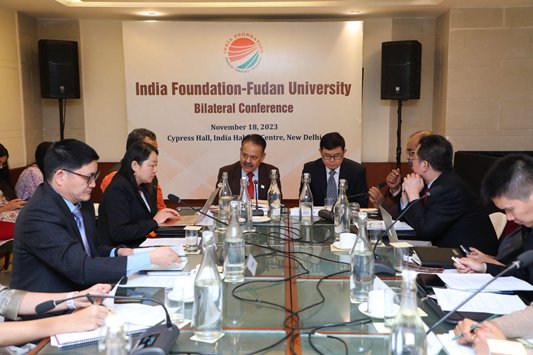
The first Working Session was titled, ‘Changing Geopolitical Environment and its impact on India-China Relations’. It was chaired by Vice Adm Shekhar Sinha, Chairman, Board of Trustees, India Foundation. The speakers at the session were Dr Zhang Jiadong, Director of Center for South Asia Studies, Fudan University; Capt Alok Bansal, Director, India Foundation; Dr Wei Zongyou, Professor at the Center for American Studies, Fudan University and Ms Shikha Aggarwal, Senior Research Fellow, India Foundation.
In his opening remarks, Adm Sinha remarked on the internal and external factors which impact India-China relations in light of the increasing lack of trust between the two countries. He emphasized on identification and bridging the gaps between India and China and improving our bilateral ties by encouraging people to people contact.
Prof Zhang Jiadong divided India-China relations in three chronological stages emphasizing on our commonalities of culture and the many similarities in our current policies. He spoke about how China and India have often worked on the state of their bilateral relations which could not progress due to geographical and trade disputes which exacerbated post covid-pandemic. Prof. Jiadong expressed that owing to the situation of multi polarization and world powers, the efforts towards independence and freedom became more difficult as the capability of control increased due to which both the countries went through fundamental changes in their social and economic structure. He concluded by saying that both the countries must acknowledge the issues between them and work towards a more strategic cohesiveness by building respect for each other.
Ms Shikha Aggarwal focused on India and China’s post- Galwan dynamic, strategic distrust and the national policies that might have undermined the trust between the two countries. She stated about the global security initiative that China ensued recently and how it affected the global world and specifically India. She mentioned the concerns that India holds in current times due to China’s strategic decisions on security and how it could influence India in a negative manner. Ms Aggarwal concluded by mentioning about bringing down the strategic distrust between India and China and comprehending the India-China dynamic.
Prof Wei Zongyou characterized and defined the role of China in the geopolitical landscape of the Indo-Pacific region. He stated about the longtime strategic competition between the United States and China and how the trade relations were affected when the Presidency of the United States shifted. Prof Wei also spoke about the high-tech competition and the rising issues between India and China and dependence on China for being the major supply chain. He stressed on generating communication and establishing dialogue to manage the hostile relations and working towards stabilization between the two countries.
Capt Alok Bansal emphasized on the current changing geopolitical environment of the world due the Russia-Ukraine War and the Israel-Hamas conflict and India and China holding similar views against these conflicts. He also mentioned China’s mild attitude towards countries like Pakistan and Afghanistan that have been promoting religious radicalisation and jihadi terrorism for the last many years and how this has affected the India-China relations. The second issue he raised was regarding the territorial dispute between BRI (Belt and Road Initiative) and CPEC (China-Pakistan Economic Corridor), it being the issue of infringement and the question of its economic viability. He considered it to be a matter of sensitivity that China should confer upon. The third issue on which he focused was on freedom of navigation because India’s trade is largely dependent on its maritime independence. Lastly, he spoke about the issue of G2 (Group of Two) and how it is difficult for India which believes in ‘Vasudhaiva Kutumbakam’ to accept China-US relations. He concluded by mentioning that India and China both being Asiatic cultures have the same basic value system and are much different from the individualised West and thus should be cognizant of each other’s sensitivities for a peaceful coexistence of the neighboring countries.
Working Session 2
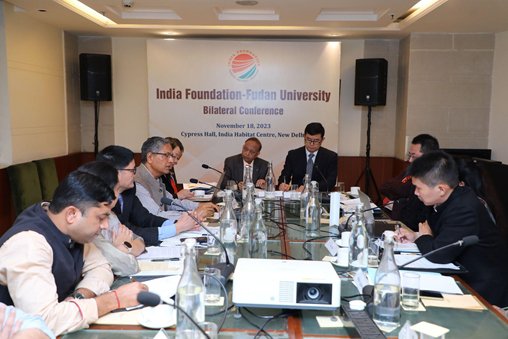
The second Working Session was titled, ‘Managing Trade Imbalance and Enhancing People-to-People Connect’. The session was chaired by Prof Zhang Jiadong, Professor, Fudan University. The speakers of the session were Prof SK Mohanty, Professor, Research and Information System for Developing Countries (RIS); Prof Tu Yichao, Associate Professor at the Center for American Studies, Fudan University; Ms Gaurie Dwivedi, Economist & Journalist and Prof Xie Chao, Associate Professor at the Institute of International Studies, Fudan University and Associate Editor-in-Chief of Quarterly Journal of International Politics.
Prof Zhang Jiadong initiated the session by putting forth the importance of people to people connect and its relevance in today’s world at a global stage.
Prof SK Mohanty focused on India-China trade relations in the present world. He explained the present bilateral economic scenario among the two countries and rise of discontent between the two countries amid growing trade relations. He discussed the issue of unsustainable trade leading to growing trade imbalances post Covid-pandemic. Speaking about the structure of trade and composition of imports from China, he concluded that India could be a long lasting partner of China if handled properly given that India has been the largest contributor to the trade surplus of China after the US, Hong Kong, and Netherlands. Professor Mohanty concluded by saying that India should follow a strategic approach to deal with China in building bilateral trade relationships and work together in the value chain sector in the third market.
Prof Tu Yichao focused on people-to-people connect and the relevance of cultural exchange on a local, state and global level and the importance of these relationships with respect to international relations. She referred to the old relations between China and India having ancient civilizations, history and culture and also emphasized on the importance of Buddhism that originated in India but spread to most neighboring nations. She credited the Han dynasty for laying the foundation of India-China relations in China. Prof Tu spoke about mutual respect for ancient traditions in India and China which has been a catalyst for increase in commercial exchange between the two countries. The cultural ties between the two countries have influenced people in modern times. The importance of various ancient literatures, music and yoga, also bound people at spiritual levels as well.
Speaking about the post-Covid pandemic era, Prof Tu mentioned about the difficulties that people face in the current scenario and that we should consider for an alternative path towards the phenomena where people can believe and work together to enhance people to people exchange.
Ms Gaurie Dwivedi emphasized on the comparison of economic relations between India and China in 2012 and 2022. She spoke about India being the largest trading partner of China in 2012 and called it a backdrop for greater heights in the economic balance between the two countries because the Indian economic ecosystem was integrating Chinese regulations. In 2022, the relations changed and she pointed out that globalization and technology are not economic but strategic issues and that this shift in a decade explained the India-China story. The economic interdependence between two countries was considered good and to alleviate political strain and facilitate answers to geopolitical problems and challenges but in the trajectory of last decade, the political friction between the two countries exacerbated those challenges and India reduced its economic interdependence on China. Ms Dwivedi stated the importance of diversification of the economic and technology sectors of both the countries that could shape overall India-China bilateral ties.
Prof Xie Chao spoke on India-China trade imbalance, its impact globally and various ways in which it could be handled by both the nations. He mentioned the changes in the economic ties between both the countries, economic imbalance being a long standing issue and its effect at the global level. He stated positively about India’s steady growth with respect to its sectors of economy and trade and that India should rethink the issues of trade imbalance in a positive manner. Mentioning various ways of handling the different positions of India and China, he focused on the standpoint of open and fair discussions and giving respect to perceptions of both the nations and working towards narrowing the gap. He emphasized on the growth of bilateral relations is dependent largely on trade relations, India and China both being at the ends of the supply chain. Referring to historical linkages between two countries, he said that both countries should work together on capacity building as a part of emerging economies.
Working Session 3
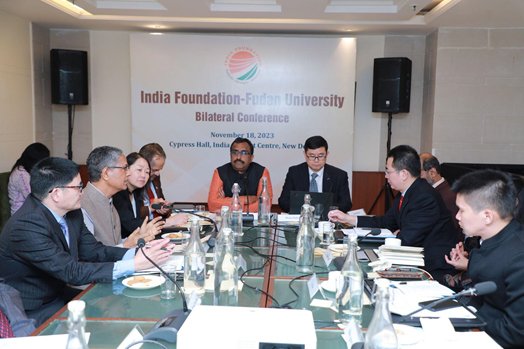
The third Working Session was titled, ‘India-China Relations: The Peace Parameters’ and was chaired by Dr Ram Madhav, President, India Foundation. The speakers of the session were Prof Liu Zongyi, Director of the Research, Shanghai Institutes for International Studies (SIIS); Prof Swaran Singh, Professor, Centre for International Politics, Organisation & Disarmament, School of International Studies, Jawaharlal Nehru University (JNU); Prof Zhang Jiadong, Professor of international relations, Fudan University and Prof Ravi Prasad Narayanan, Associate Professor, School of International Studies, Jawaharlal Nehru University (JNU).
Dr Ram Madhav initiated the session by speaking about establishing the groundwork for lasting peace between India and China and promoting the values and parameters to build peace throughout the world. Quoting the External Affairs Minister of India, he highlighted on the three pillars, – ‘mutual respect’, ‘mutual sensitivity’ and ‘mutual interest’.
Prof Liu Zongyi focused on collective working towards improving the bilateral relations between India and China. He referred to ancient Asian civilizations and the ancient linkages between the two countries and emphasized on making efforts to improve the neighborhood relations. He also spoke on the issues of India and China in the international order and to deal with the trilateral relation among India, China and US. He raised concerns on the ongoing economic imbalance between India and China and called for stable and safe bilateral relations.
Prof Swaran Singh spoke about the measurable factors that would explain peaceful relations between India and China, namely, trust deficit, the colonial experience, and both having transformed societies in comparison to their old establishments and both being conscious of their historical roots. Prof Singh said that the border disputes have fatigued the peace and tranquility between the two countries and thus to ensure peace parameters, the discussions on border dispute must come at the center stage. He explained three things that explain India-China relations: dynamic bilateral equations; increasing pressure of internal expectations and mosaic of contestations. He concluded by speaking about the peace parameters which should focus on building of expertise and strategic communication between the institutions of both the countries.
Prof Zhang Jiadong gave a pragmatic and optimistic outlook on India and China relations. He focused mainly on the civilizational and cultural importance of both India and China. He mentioned that the political standoff between the two countries emerged much later in time and with their growth, both the nations underwent a lot of changes affecting the dimension of peace for both countries. Prof Jiadong spoke about the geographical and strategic differences between India and China, India being from South Asia and China from East Asia which also explained their dynamic neighborhood relations. He emphasized on working towards economic betterment of both the countries and creating a common ground for negotiations for a new normal for India and China relations.
Prof Ravi Prasad Narayanan remarked on the civilizational importance of India and China and both the countries sharing the religious connect with each other through Buddhism. He emphasized on working towards a common foreign policy by the government of both the countries and should move out from the Westphalian phase because conflict of any manner stalls the economic progress of the nation. He also stated the importance of civilizational connection between both the countries and thus the need to study, develop and promote easier movement of people between India and China.
Concluding Session
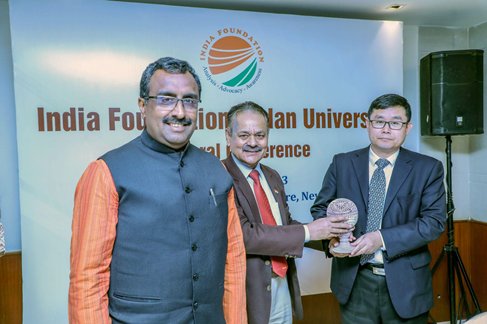
Vice Adm Shekhar Sinha and Prof Zhang Jiadong concluded the Conference by expressing their appreciation towards the delegates from India and China and congratulated everyone for fair, fruitful and intense discussions.
They emphasized on developing trust between India and China along with the settlement of border disputes and the economic imbalance and stressed for moving towards the right direction of peace and tranquility.



